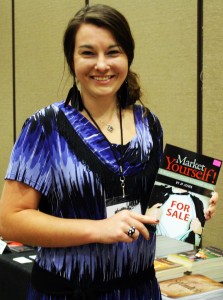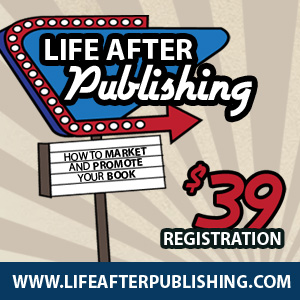In this guest post, author and writing conference organizer J.P. Jones shares tips for making the most of the next writer’s conference or seminar you attend. — MVR
Hear an author mention that they’re going to a writer’s conference to sell some of their books and you probably picture them shaking hands, passing out business cards and generally working the room to gain attention.

That kind of overt networking is one way to market your books at a conference – but it’s not the only way. There are much subtler ways of letting people know about yourself and your work that can be equally or even more effective.
The writer conference season is upon us, so if you’re planning to attend one or more, here are some better ways to promote yourself or your work before, during and after an event:
Before the Event
1. Add the event to your online itinerary. Most authors keep a schedule posted online of book signings, readings and other events they do to support their books. If you don’t, start one! When you decide to attend a seminar or conference, post it to your online itinerary. When readers check out your site, they’ll see that your schedule is full, which re-enforces the fact that you are serious about your writing.
2. Volunteer. Most events have opportunities to volunteer, which is great for marketing purposes. Volunteering gives you a chance to connect with conference hosts and organizers, which in itself can be an advantage as many of them are well connected in the industry. Mention your volunteer duties on your website and in any promotions, which shows that you’re involved in the community.
At the Event
3. Take an indirect approach. Forget in-your-face glad-handing. The best marketing is indirect: talk to people, about yourself, your books or other work. When you do, you give them the opportunity to pursue you. I recently tested this at a major writing event where authors could sell their books at the conference bookstore. I wrote several blog posts and tweets about my books being sold at the event. But I purposely did not mention where conference goers could buy them. The next day people approached me to ask for a link, and I sold several books as a result.
4. Collect contact information from other authors. If you meet other authors, ask to swap email addresses and social media handles. Between sessions, take a moment to connect with new acquaintances online and then send them a quick note. You already have a ready-made icebreaker, ask about their experience at the event!
5. Live tweet the event. When you’re at a conference or seminar, you’re picking up information you can turn around and share with others, all the better to market yourself. If you haven’t ever live tweeted a panel discussion or talk, it’s easy. Post updates, great quotes, stirring directives or your takeaways from what you hear. Use the appropriate hashtag to let your Twitter followers know what event you’re covering.
6. Take postcards and bookmarks to share. Most conferences have a table or booth where authors can leave postcards or bookmarks for their books or other work. Always bring business cards with you too, for the same reason. Giving someone something to take home is a great way to share your books and information.
7. Post photos. Whether you have a smart phone or a small point-and-shoot digital camera, snap a few shots at the event. Take pictures of speakers, your books for sale, or special signings you attend. As they say, a picture is worth a thousand words, don’t miss an opportunity to SHOW your followers the event you’re attending. Photos also are great to use on Twitter, Instagram and Flickr, and on your website or blog. Posting an image is a great way to vary the type of information you share during the event so you’re not overwhelming or annoying your followers.
After the Event
8. Blog about your experience. Once you’re back home, write about the conference on your blog or website. Share tips you gleaned, advice from your favorite speakers and your overall thoughts about the event. Be honest and fair, but at the same time, err on the side of the positive. The conference might have been a disaster, but don’t dwell on that. Find at least one good thing you learned and focus on it.
 9. Follow up on special offers. Many conferences sponsors offer discounts or other specials to attendees. When you’re going through the conference literature you picked up, go sponsor materials for deals on products or services that could help your marketing efforts. I’ve discovered many marketing gems this way. I once had my book featured in a writer’s magazine because I contacted them after an event they’d sponsored and struck up a conversation with one of the editors. Marketing mission accomplished.
9. Follow up on special offers. Many conferences sponsors offer discounts or other specials to attendees. When you’re going through the conference literature you picked up, go sponsor materials for deals on products or services that could help your marketing efforts. I’ve discovered many marketing gems this way. I once had my book featured in a writer’s magazine because I contacted them after an event they’d sponsored and struck up a conversation with one of the editors. Marketing mission accomplished.
10. Write a testimonial. This may be my favorite conference marketing trick because it’s so overlooked. Conferences get lots of attention in the writing world, and their websites also do well in search engine rankings. Take advantage of both by asking the organizers if you can write a testimonial or review of the event. If you do, include the titles of your books and a link to your website. Many conferences post reviews on their websites or use them in newsletters or other promotions, giving your words – and you – great exposure.
JP Jones is the author of Market Yourself: A Beginner’s Guide to Social Media and 31 Days of Marketing. She also is a co-host of Life After Publishing, an Oct. 20 webinar that teaches authors how to market themselves and get the recognition they deserve.